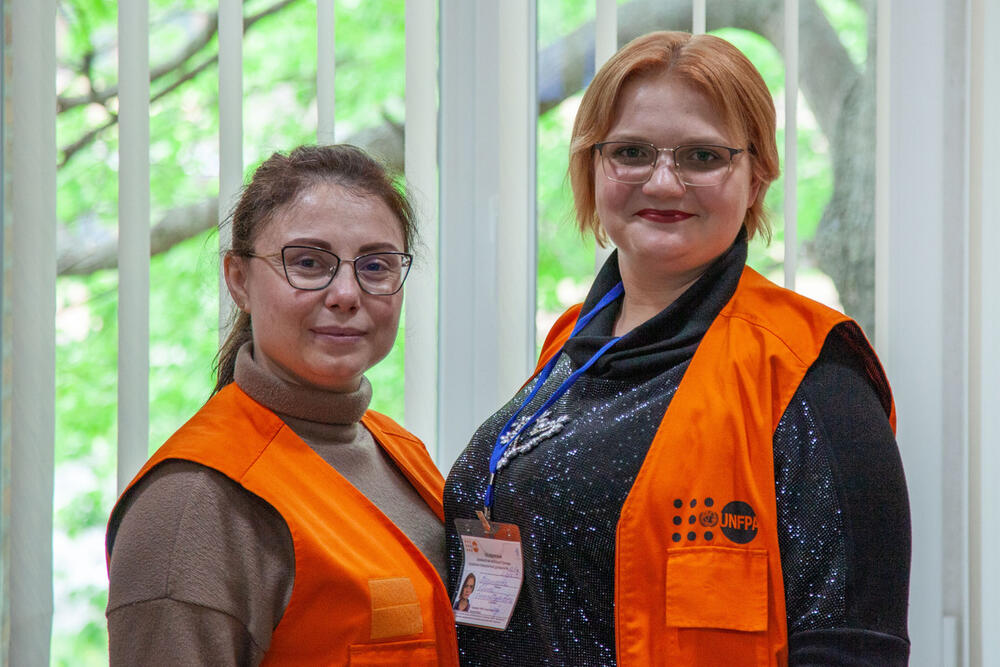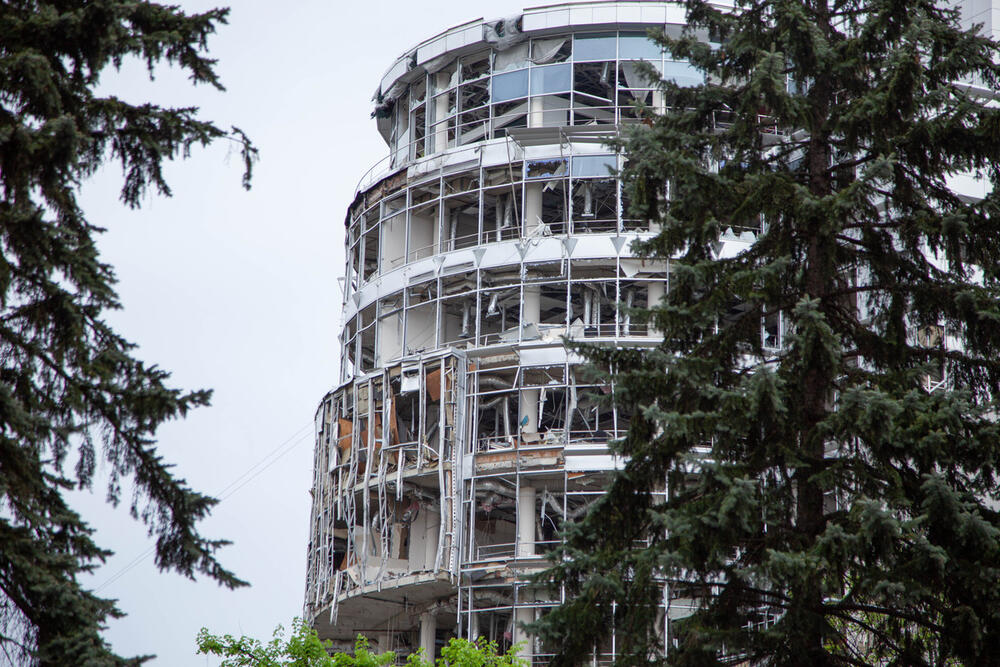News
The emotional cost of combating gender-based violence on the front line in Ukraine
- 13 June 2024
News
KHARKIV, Ukraine – “There was a call from the police – not from the survivor herself. We went with them, and there was physical, psychological, and economic abuse happening,” explained Olena Kuznietsova, a psychologist based in Kharkiv.
Ms. Kuznietsova is part of a mobile psychosocial support team supported by UNFPA, the United Nations sexual and reproductive health agency. Hers is one of more than 100 teams deployed across Ukraine to respond to surging reports of gender-based violence.

Once the team arrived, the situation quickly turned more aggressive. “The man was very violent; he was threatening to kill the mobile team, kill the police, so they restrained him,” said Ms. Kuznietsova.
“The emergency medical services were called, but as there were no severe injuries the wife, Kateryna*, was taken to a safe place rather than the hospital.”
Although cases of gender-based violence are notoriously underreported, mainly due to stigma, a lack of faith in reporting systems, and in Ukraine also for ongoing security issues, some 2.5 million are estimated to be in need of assistance. Since the start of the full-scale invasion in February 2022, reports of multiple forms of violence have spiked, including conflict-related sexual violence, domestic abuse and trafficking.
A psychological burden
UNFPA began piloting psychosocial support teams in Ukraine in 2015 to reach women and girls in hard-to-access areas of the Donetsk and Luhansk regions. Since the full-scale invasion, this has expanded to the front lines of war, supporting gender-based violence survivors with mental and physical health assistance and referrals to safe spaces.
Over the last two years, the teams have shouldered increasing responsibilities – including providing support under fire. As such they are also trained to deal with anxiety, panic attacks and stress, including for workers themselves.
“On the way to the domestic violence shelter [in Kharkiv], a nearby factory was hit. We saw smoke. There were screams. It made such a loud noise that the cars screeched to a halt,” said Ms. Kuznietsova.
“We descended into a nearby subway being used as a bomb shelter. Kateryna and her children were shaken, a crowd of people were running all over the place, screaming. It was terrifying. She started having another panic attack and struggled to breathe.”
Kharkiv is very close to the front line, so civil infrastructure has been heavily damaged, much of it destroyed. Many say they hear the bombs first before the air raid alarm sounds. There is an urgent need for food, medicine, power generators and material to rebuild the city – but mental health and gender-based violence response must also be prioritized, including for first responders.

A need for mental health care
Together with the Ukrainian Government, UNFPA supports hotlines, shelters, crisis rooms and day centres – which reached over 190,000 people in Ukraine from January to March 2024 alone. In December 2023, UNFPA launched psychosocial support services for families of veterans, as the war pushes families into deteriorating mental and emotional states.
Ms. Kuznietsova explained that many men returning from combat struggle with undiagnosed mental health challenges. “They are returning from the war and there's no reintegration period. Some are traumatized and take it out on their families.”
There is also stigma around seeking support, as it can be perceived as a weakness or reserved for those with severe mental illness – even though psychological disorders affect an estimated 30 per cent of the population in Ukraine. This figure is only projected to rise with the war, and some 9.6 million people may have developed a mental health condition over the past two years.
Support for front-line workers
UNFPA mobile teams are first responders when there are military strikes, providing not just psychosocial support but also delivering dignity kits for women and girls forced to evacuate with little notice. The teams are constantly on the lookout for new safe spaces, as Ms. Kuznietsova explained.
“Sometimes there's nowhere to take people, let alone to provide psychological or social help. Staying where there have been strikes is very dangerous – the Russian military often hits the same place twice.”
Despite the harsh conditions, the teams have found kindness and solidarity in the people of Kharkiv. “One time when we were working under shelling, a woman came to us and said she had an apartment available if there were people who needed a place.”
In the first three months of 2024, UNFPA reached more than 80,000 people across the region with critical psychosocial services, but greater long-term support will be needed for the people of Ukraine – and for those working to help them. “We have a strong team and we help each other get back to normal, but front-line workers need more psychosocial help. We need it.”
*Name changed for privacy and protection